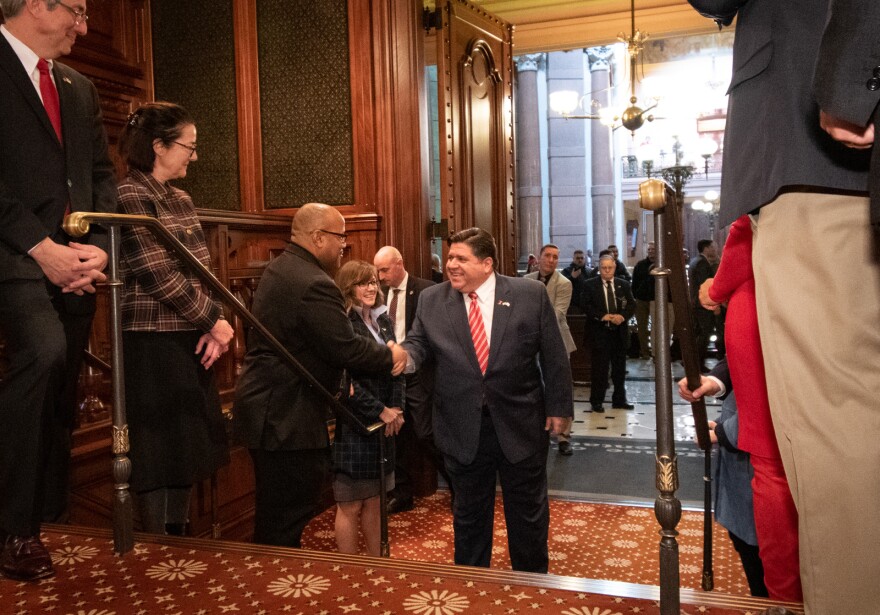Illinois Gov. J.B. Pritzker is already making plans to spend money from a significant change in the state income tax, even though it can only happen if voters agree to amend the Illinois Constitution this November.
A significant chunk of Pritzker’s annual budget proposal, delivered Wednesday, depends on the governor's graduated income tax.
When figuring out what sort of spending plan to present to the General Assembly, governors are constrained. They're not supposed to base their plans on tax increases that may or may not happen.
But Pritzker has made a tax increase a central goal of his administration. Last year, he and his fellow Democrats proposed a graduated income tax for Illinois, where wealthier people would pay a higher rate.
The problem for Pritzker is in order for that to happen, Illinois voters will have to agree to change the Illinois Constitition at this fall's election. So any extra tax money that would be generated is speculative.
Because of that, Pritzker used his budget address to make a case for a graduated income tax.

“No amount of wishful thinking will wave away our structural deficit or our pension obligations,” Pritzker said. “No amount of lip service will balance the budget or fund our schools or improve public safety.”
Pritzker laid out all the areas where thinks the state should spend more money, but only if the graduated income tax goes through. This contingent spending — the administration calls it a “reserve” — totals $1.4 billion dollars.
Probably the single most important chart in @GovPritzker’s budget book today: about $1.5b in proposed spending that’s contingent on Illinois voters approving a graduated income tax this November.
— Brian Mackey (@BrianMackey) February 19, 2020
Without it, no increase for universities, reduced increase for K-12, etc. pic.twitter.com/tzT7S76xHQ
“Because this reserve is so large, it inevitably cuts into some of the things that we all hold most dear: increased funding for K-12 education, universities and community colleges, public safety and other key investments,” Pritzker said.
Among the spending Pritzker said would be held back until after the election is money for one of three new classes of state troopers, a 5% increase in operating money for universities, and a big piece of an annual increase in education funding. (There would be an additional $100 million earmarked for pension obligations and another $50 million for the state’s Budget Stabilization Fund, popularly known as a “rainy day fund.”)
Education funding was part of a multi-year, bipartisan effort to bring more equity to state schools — bridging the gap between rich and poor districts.
The thing is, that increase is set in law, and the idea of making it subject to the whim of voters rubbed some lawmakers the wrong way.
“The idea of school funding reform is that we would always appropriate what's by statute. I think we should do that,” said state Sen. Cristina Castro, a Democrat from Elgin.
She said it's early in the process and there's room for negotiation, but “We’re going to work very diligently to make sure everything is done the way it should be.”
Castro wasn’t the only Democrat sounding notes of caution. House Majority Leader Greg Harris is also predicting a tough budget season.
“It’s going to be hard to go through a lot of these recommendations he’s made and prioritize, but it’s the work we’ve got to do to put ourselves back on stable footing,” Harris said during an appearance on public television’s Illinois Lawmakers.
Beyond that, not all of Pritzker's one-and-a-half billion dollar reserve is optional spending — it also includes hundreds of millions of dollars for corporate income tax refunds and state worker health care.
“We’re still going to accrue those liabilities,” state Rep. Tom Demmer, a Republican from Dixon, said after the speech.
“State employees are still going to go tot he doctor in fiscal year 21. The difference is: The governor is saying if the tax increase doesn’t pass, he’s not going to pay them. That’s exactly the kind of problem that led us to have (a) ballooning unpaid bill backlog, and he’s proposing to go right back into that playbook.”

Republicans also said this approach is unnecessary. House Republican Leader Jim Durkin, of Western Springs, told reporters the economy is strong, unemployment is low, and the state should be able to balance its budget without having to reach into taxpayers’ pockets.
“We don’t feel that we have to have a budget that is going to be conditioned on this pixie dust that he’s spreading through the Capitol on this constitutional amendment,” Durkin said. “It’s just not right.”
Returning to the speech, Pritzker would probably appreciate the Republican leader’s acknowledgement that the economy is doing OK.
“It’s become something of a political sport in this state over the last several years to present our fiscal issues as insurmountable,” Pritzker said.
Yes, the budget challenges are hard, he said. And yes, Illinois government is more complicated.
But “our future will not be built on the shaky rhetorical foundation of those who keep rooting for us to fail,” Pritzker told lawmakers.
In other words, if Illinois wants to live its best life — at least from a fiscal perspective — it's time to knock off the negative self-talk.
Illinois Issues is in-depth reporting and analysis that takes you beyond the headlines to provide a deeper understanding of our state. Illinois Issues is produced by NPR Illinois in Springfield.
You can email Brian Mackey or browse his story archive. You can also follow him on Twitter or subscribe to his RSS and podcast feeds.






